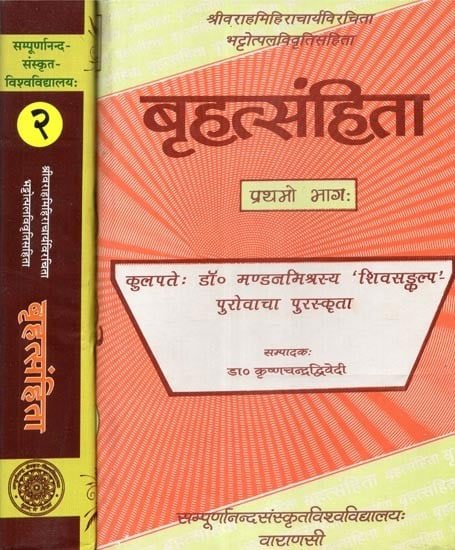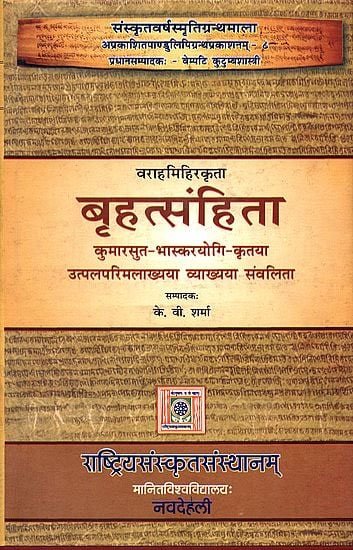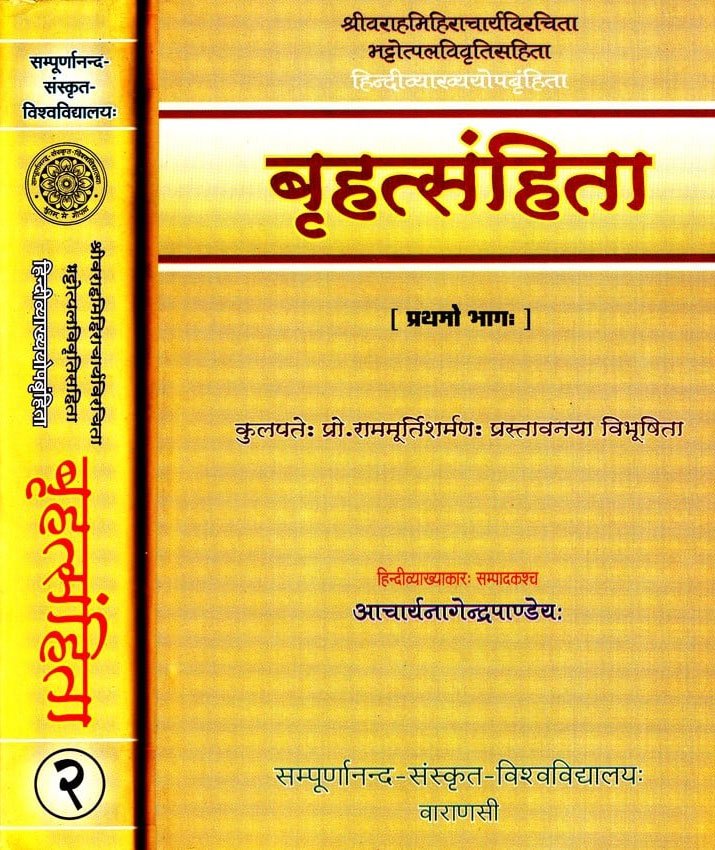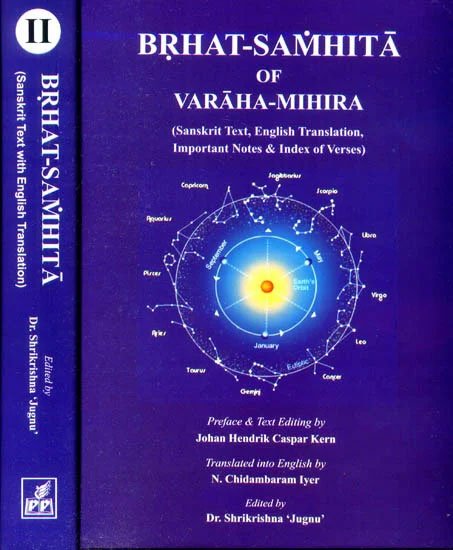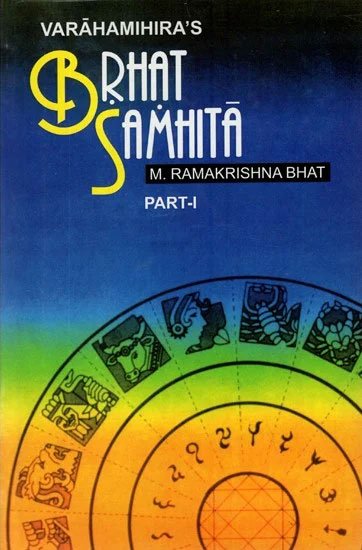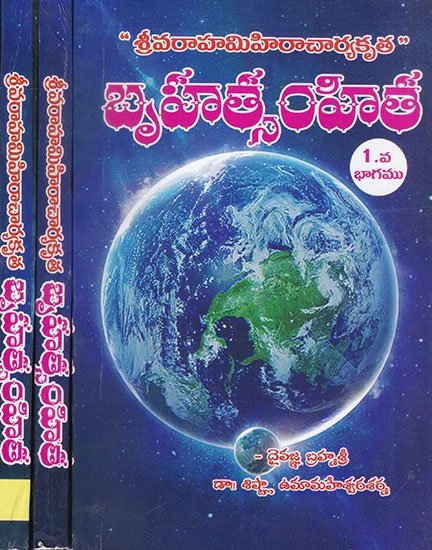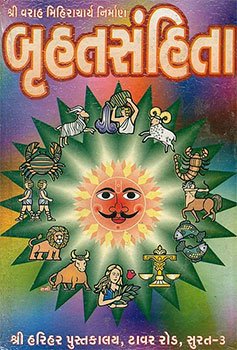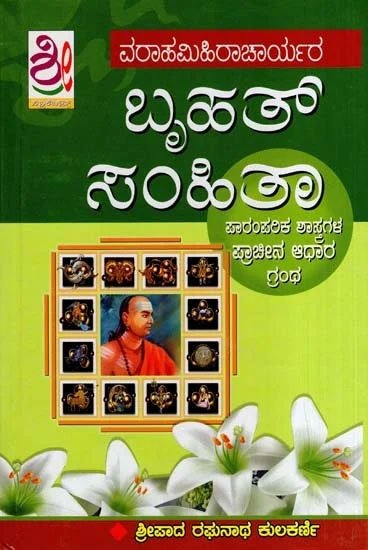Brihat-samhita [sanskrit]
26,560 words
The Sanskrit text of the Brihat-samhita from the 6th-century authored by Varaha Mihira in present-day Ujjain, India. It primarily deals with astrology and astronomy but is presented as an encyclopedia of knowledge.
Verse 84.9
अभिमुखपतितं प्रशान्तदिक्स्थं शुभमतिशोभनमूर्ध्वसंस्थितं यत् ।
अशुभकरमतोऽन्यथा प्रदिष्टं स्थितपतितं च करोति मृष्टमन्नम् ॥ ९ ॥
abhimukhapatitaṃ praśāntadiksthaṃ śubhamatiśobhanamūrdhvasaṃsthitaṃ yat |
aśubhakaramato'nyathā pradiṣṭaṃ sthitapatitaṃ ca karoti mṛṣṭamannam || 9 ||
The Sanskrit text of Verse 84.9 is contained in the book Brihata Samhita (Sanskrit Text with Hindi Translation) by Pandit Achyutananda Jha. This book is available online or you could buy the latest edition:
Read online Buy now! The Sanskrit text by Pandit Achyutananda Jha (2001)
Glossary of Sanskrit terms
Note: This extracts Sanskrit terms and links to English definitions from the glossary, based on an experimental segmentation of verse (84.9). Some terms could be superfluous while some might not be mentioned. Click on the word to show English definitions.
Abhimukha, Patita, Prashanta, Dish, Stha, Shubhamati, Shobhana, Urdhva, Samsthita, Yat, Yad, Ashubhakara, Atah, Anyatha, Pradishta, Sthita, Karoti, Mrishta, Anna,
Analysis of Sanskrit grammar
Note: this is an experimental feature and only shows the first possible analysis of the Sanskrit text (Verse 84.9). If the system was successful in segmenting the sentence, you will see of which words it is made up of, generally consisting of Nouns, Pronouns, Verbs, Participles and Indeclinables. Click on the link to show all possible derivations of the word.
- Line 1: “abhimukhapatitaṃ praśāntadiksthaṃ śubhamatiśobhanamūrdhvasaṃsthitaṃ yat ”
- abhimukha -
-
abhimukha (noun, masculine)[compound], [vocative single]abhimukha (noun, neuter)[compound], [vocative single]
- patitam -
-
patita (noun, masculine)[adverb], [accusative single]patita (noun, neuter)[adverb], [nominative single], [accusative single]patitā (noun, feminine)[adverb]√pat -> patita (participle, masculine)[accusative single from √pat class 1 verb]√pat -> patita (participle, neuter)[nominative single from √pat class 1 verb], [accusative single from √pat class 1 verb]
- praśānta -
-
praśānta (noun, masculine)[compound], [vocative single]praśānta (noun, neuter)[compound], [vocative single]
- dik -
-
diś (noun, feminine)[compound], [adverb], [nominative single], [vocative single]
- stham -
-
stha (noun, masculine)[adverb], [accusative single]stha (noun, neuter)[adverb], [nominative single], [accusative single]sthā (noun, feminine)[adverb]sthā (noun, masculine)[adverb]
- śubhamati -
-
śubhamati (noun, masculine)[compound], [adverb]śubhamati (noun, feminine)[compound], [adverb]śubhamati (noun, neuter)[compound], [adverb], [nominative single], [vocative single], [accusative single]
- śobhanam -
-
śobhana (noun, masculine)[adverb], [accusative single]śobhana (noun, neuter)[adverb], [nominative single], [accusative single]śobhanā (noun, feminine)[adverb]
- ūrdhva -
-
ūrdhva (indeclinable preposition)[indeclinable preposition]ūrdhva (noun, masculine)[compound], [vocative single]ūrdhva (noun, neuter)[compound], [vocative single]
- saṃsthitam -
-
saṃsthita (noun, masculine)[adverb], [accusative single]saṃsthita (noun, neuter)[adverb], [nominative single], [accusative single]saṃsthitā (noun, feminine)[adverb]
- yat -
-
yat (indeclinable relative)[indeclinable relative]yat (noun, masculine)[compound]yad (noun, masculine)[compound], [adverb], [nominative single], [vocative single]yat (noun, neuter)[nominative single], [vocative single], [accusative single]√i -> yat (participle, neuter)[nominative single from √i class 2 verb], [vocative single from √i class 2 verb], [accusative single from √i class 2 verb]yat (pronoun, neuter)[nominative single], [accusative single]
- Line 2: “aśubhakaramato'nyathā pradiṣṭaṃ sthitapatitaṃ ca karoti mṛṣṭamannam ”
- aśubhakaram -
-
aśubhakara (noun, masculine)[adverb], [accusative single]aśubhakara (noun, neuter)[adverb], [nominative single], [accusative single]
- ato' -
-
ataḥ (indeclinable)[indeclinable]
- anyathā -
-
anyathā (indeclinable)[indeclinable]anyathā (noun, feminine)[nominative single]
- pradiṣṭam -
-
pradiṣṭa (noun, masculine)[adverb], [accusative single]pradiṣṭa (noun, neuter)[adverb], [nominative single], [accusative single]pradiṣṭā (noun, feminine)[adverb]
- sthita -
-
sthita (noun, masculine)[compound], [vocative single]sthita (noun, neuter)[compound], [vocative single]√sthā -> sthita (participle, masculine)[vocative single from √sthā class 1 verb]√sthā -> sthita (participle, neuter)[vocative single from √sthā class 1 verb]
- patitam -
-
patita (noun, masculine)[adverb], [accusative single]patita (noun, neuter)[adverb], [nominative single], [accusative single]patitā (noun, feminine)[adverb]√pat -> patita (participle, masculine)[accusative single from √pat class 1 verb]√pat -> patita (participle, neuter)[nominative single from √pat class 1 verb], [accusative single from √pat class 1 verb]
- ca -
-
ca (indeclinable conjunction)[indeclinable conjunction]ca (noun, masculine)[compound], [vocative single]ca (noun, neuter)[compound], [vocative single]
- karoti -
-
karoti (noun, masculine)[compound], [adverb]karoti (noun, feminine)[compound], [adverb]karoti (noun, neuter)[compound], [adverb], [nominative single], [vocative single], [accusative single]√kṛ (verb class 8)[present active third single]
- mṛṣṭam -
-
mṛṣṭa (noun, masculine)[adverb], [accusative single]mṛṣṭa (noun, neuter)[adverb], [nominative single], [accusative single]mṛṣṭā (noun, feminine)[adverb]√mṛṣ -> mṛṣṭa (participle, masculine)[accusative single from √mṛṣ class 1 verb], [accusative single from √mṛṣ class 4 verb]√mṛṣ -> mṛṣṭa (participle, neuter)[nominative single from √mṛṣ class 1 verb], [accusative single from √mṛṣ class 1 verb], [nominative single from √mṛṣ class 4 verb], [accusative single from √mṛṣ class 4 verb]√mṛch -> mṛṣṭa (participle, masculine)[accusative single from √mṛch class 6 verb]√mṛch -> mṛṣṭa (participle, neuter)[nominative single from √mṛch class 6 verb], [accusative single from √mṛch class 6 verb]√mṛj -> mṛṣṭa (participle, masculine)[accusative single from √mṛj class 1 verb], [accusative single from √mṛj class 2 verb], [accusative single from √mṛj class 6 verb]√mṛj -> mṛṣṭa (participle, neuter)[nominative single from √mṛj class 1 verb], [accusative single from √mṛj class 1 verb], [nominative single from √mṛj class 2 verb], [accusative single from √mṛj class 2 verb], [nominative single from √mṛj class 6 verb], [accusative single from √mṛj class 6 verb]√mṛś -> mṛṣṭa (participle, masculine)[accusative single from √mṛś class 6 verb]√mṛś -> mṛṣṭa (participle, neuter)[nominative single from √mṛś class 6 verb], [accusative single from √mṛś class 6 verb]√mṛj (verb class 2)[imperative active second dual]
- annam -
-
anna (noun, masculine)[adverb], [accusative single]anna (noun, neuter)[adverb], [nominative single], [accusative single]annā (noun, feminine)[adverb]
Other editions:
Also see the following editions of the Sanskrit text or (alternative) English translations of the Verse 84.9
Brhatsamhita with the Commentary of Bhattotpala
by Krishna Chandra Dwivedi (2016)
Publisher: Sampurnanand Sanskrit University; 1229 pages;
Buy now!
Brihat Samhita with the Commentary of Utpalapatimala of Yogisvara
by K. V. Sharma (2012)
Publisher: Rashtriya Sanskrit Sansthan, Janakpuri; 754 pages; ISBN-10; 8186111360; ISBN-13: 9788186111369
Buy now!
Brihat Samhita (Hindi Translation)
by K. V. Sharma (2002)
Publisher: Sampurnanand Sanskrit University; 2359 pages; ISBN-13: 9789387890008.
Buy now!
Brhat Samhita (English translation)
by N. Chidambaram Iyer (2022)
Publisher: Parimal Publication Pvt. Ltd.; 801 pages; Edited by Dr. Shrikrishna Jugnu; ISBN-10: 8171104215; ISBN-13: 9788171104215.
Buy now!
Brhat Samhita (English with notes)
by M. Ramakrishna Bhat (2010)
Publisher: Motilal Banarsidas Publishers Pvt. Ltd.; 1155 pages; ISBN-10: 8120810600; ISBN-13: 9788120810600.
Buy now!
Brhat Samhita (Telugu translation)
by Sishtla Umamaheswara Sharma (2020)
Publisher: Mohan Publications, Andhra Pradesh; 846 pages.
Buy now!Preview of verse 84.9 in Kannada sript:
ಅಭಿಮುಖಪತಿತಂ ಪ್ರಶಾನ್ತದಿಕ್ಸ್ಥಂ ಶುಭಮತಿಶೋಭನಮೂರ್ಧ್ವಸಂಸ್ಥಿತಂ ಯತ್ ।
ಅಶುಭಕರಮತೋಽನ್ಯಥಾ ಪ್ರದಿಷ್ಟಂ ಸ್ಥಿತಪತಿತಂ ಚ ಕರೋತಿ ಮೃಷ್ಟಮನ್ನಮ್ ॥ ೯ ॥
Brhat Samhita (Gujarati translation)
by - (2000)
Publisher: Shree Harihar Pustakalay, Surat; Author: Shri Varahamihira Acharya (શ્રી વરાહમિહીરાચાર્ય); 432 pages.
Buy now!Preview of verse 84.9 in Gujarati sript:
અભિમુખપતિતં પ્રશાન્તદિક્સ્થં શુભમતિશોભનમૂર્ધ્વસંસ્થિતં યત્ ।
અશુભકરમતોઽન્યથા પ્રદિષ્ટં સ્થિતપતિતં ચ કરોતિ મૃષ્ટમન્નમ્ ॥ ૯ ॥
Brhat Samhita (Kannada translation)
by Sripada Raghunatha Kulkarni (2021)
Publisher: Srinidhi Publications, Bangalore; 668 pages with illustrations.
Buy now!Preview of verse 84.9 in Kannada sript:
ಅಭಿಮುಖಪತಿತಂ ಪ್ರಶಾನ್ತದಿಕ್ಸ್ಥಂ ಶುಭಮತಿಶೋಭನಮೂರ್ಧ್ವಸಂಸ್ಥಿತಂ ಯತ್ ।
ಅಶುಭಕರಮತೋಽನ್ಯಥಾ ಪ್ರದಿಷ್ಟಂ ಸ್ಥಿತಪತಿತಂ ಚ ಕರೋತಿ ಮೃಷ್ಟಮನ್ನಮ್ ॥ ೯ ॥
![Brihat-samhita [sanskrit] - book cover](/uploads/a/Brihat-Samhita-Sanskrit.jpg)
